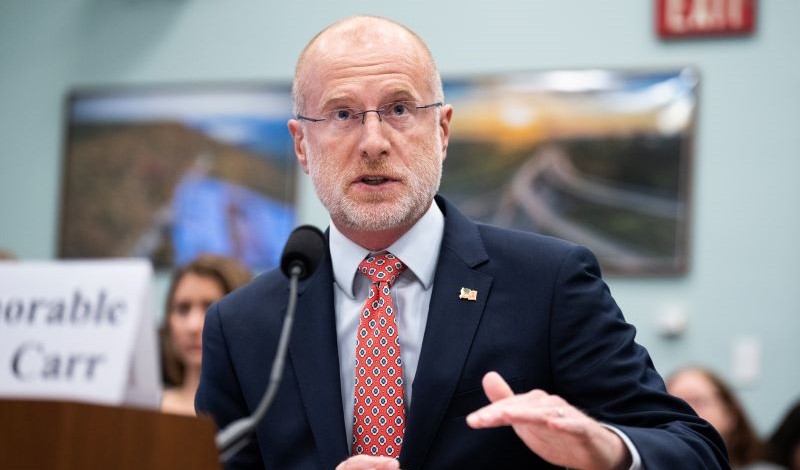
The likely end of the FCC’s independence should spur Congress to overhaul the agency.
Even before the U.S. Supreme Court granted President Donald J. Trump’s request to allow, at least for now, at-will removal of members of the National Labor Relations Board (NLRB) and the Merit Systems Protection Board (MSPB) in Trump v. Wilcox, the handwriting was on the wall. In a 2020 decision, the Court suggested that it might overrule or sharply curtail its 1935 decision in Humphrey’s Executor v. United States, where the Court upheld the constitutionality of a statute that allowed the President to remove members of the Federal Trade Commission, an independent agency like the NLRB and MSPB, only for cause.
Now the handwriting is even more clear. In Wilcox, the Court stayed pending appeal district court orders reinstating members of the NLRB and MSPB, reasoning that the “government is likely to show” that Congress cannot constitutionally limit the President’s removal power.
In her oft-cited article published in 2001, then Harvard Law School dean and now Supreme Court Justice Elena Kagan acknowledged that the lack of presidential removal power regarding the heads of independent agencies, as opposed to the heads of executive branch agencies, is “the core legal difference between these entities.” If the President may lawfully remove members of multimember agencies for any reason or for no reason, it is difficult to maintain that those agencies are “independent” in any meaningful sense.
I do not see anything in Wilcox that would protect the commissioners of the Federal Communications Commission (FCC) from dismissal at will any more than members of the NLRB or the MSPB or most other multimember boards and commissions. Indeed, unlike the enabling statutes governing most of those agencies, the Communications Act of 1934 does not contain any explicit “for cause” limitations on removal by a President. This is true even though the notable 1949 report by the Hoover Commission, headed by former Secretary of the U.S. Department of Commerce and President Herbert Hoover, recommended that the Communications Act be amended to include such a tenure protection provision.
If I am correct about the likely demise of Humphrey’s Executor, the notion that the FCC is an “independent” agency will no longer be operative. This is true regardless of whether President Trump actually does remove an FCC commissioner, because even the threat of at-will dismissal is sufficient to counter meaningful agency independence.
With that in mind, the U.S. Congress should begin considering whether the FCC should be restructured in this brave new administrative law world and, if so, how. I began to sketch, in broad strokes, what the essential element of such a restructuring might look like in a recent article. The reality, given technological and marketplace developments in the last quarter century, is that the Communications Act is long overdue for an overhaul—beyond the effects current dismissal cases may have on it.
I suggest that the FCC’s policymaking functions could be transferred to an executive branch agency subject to presidential control, such as the National Telecommunications and Information Administration—which is headed by a single administrator—in the Commerce Department, while adjudicative-type functions could remain with a multimember commission, probably with three rather than five commissioners. If the FCC were limited to performing whatever purely adjudicative functions remain and clearly denied rulemaking authority, Congress ought to be able to insulate the entity’s members from at-will presidential removal.
Simply put, as the 1947 Attorney General’s Manual on the Administrative Procedure Act declares: “Rule making is agency action which regulates the future conduct of either groups of persons or a single person; it is essentially legislative in nature, not only because it operates in the future but also because it is primarily concerned with policy considerations.” On the other hand, the Manual states that “adjudication is concerned with the determination of past and present rights and liabilities.”
Most of the FCC’s activity today occurs through rulemaking processes to develop and prescribe policies to carry out congressional delegations of authority. Over time, the amount of FCC adjudication has diminished substantially, especially as broadcast and other spectrum licenses, for the most part, are now awarded via auction rather than comparative licensing proceedings. Much of the FCC’s remaining adjudication falls into the category of “enforcement” proceedings in which the Commission, usually after an investigation by its staff resulting in a formal complaint, decides whether to impose penalties on specific regulated parties for violating agency rules.
Admittedly, considering which functions should be transferred to an executive branch agency and which might remain in a multimember commission free from executive control would require careful consideration. But given the prospective change in the law that may render “independent” agencies, including the FCC, no longer meaningfully independent, it is likely a required task.
There are two other key elements in any forthcoming Communications Act rewrite. First, the statute’s current “stovepipe” regulatory framework is woefully outdated and an impediment to the development of sound communications policy. Stovepipe regulation refers to how the Communications Act contains distinct sets of rules for pre-defined communication services, such as “telecommunications,” and “cable service.” These outdated definitions, based on what I have called “techno-functional” constructs that are tied to descriptions of technical characteristics or functional attributes, no longer make sense in today’s digital environment characterized by relentless technological and marketplace convergence driven by cross-platform competition. The existence of the stovepipes serves to maintain regulation that is no longer necessary and impedes fair competition.
Second, there are over one hundred instances in the Communications Act where Congress has delegated authority to the FCC to act in the “public interest.” For the most part, the vague public interest standard should be replaced by a market-oriented standard that requires the application of antitrust-like competition jurisprudence to determine whether service providers possess market power that should be constrained. I have discussed these ideas in much more detail in a 2006 article.
Now, almost 20 years later, the likely demise of the notion of the FCC as an “independent” agency may possibly spur Congress and the public to begin a serious discussion regarding a major overhaul of the Communications Act.




